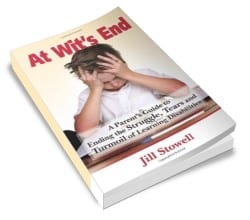Attention challenges are really hard to understand – even for students who have them. They have good intentions, and then find themselves daydreaming or doing something else when they should be working.
A parent recently shared with me that her son, who has auditory processing, reading, math, and attention challenges, is in an intervention class at school. This boy clearly has real deficits in his learning and attention but didn’t qualify as having a learning disability at school. So he isn’t getting any special education services, but he was placed in an “Intervention” math class.
On a regular basis, the mom gets notes home from the Intervention teacher saying the boy, “did nothing in class.”
When I heard this, my thought was, “It’s an Intervention Class! Intervene!”
When students have trouble paying attention and do nothing in class, there is almost always a reason. And it’s NOT laziness or not caring.
Nobody wants to fail.
My experience with thousands of students with attention and learning challenges has shown me that biological ADD/ADHD is real and extremely challenging. But much, much more prevalent are attention problems that are actually symptoms of weak underlying learning or processing skills.
The vast majority of students who come to our learning center have some challenges with attention, but the vast MINORITY are truly ADHD. Successful, easy learning depends upon a solid foundation of underlying learning skills. These include skills such as:
- Auditory and visual processing
- Memory
- Body awareness and control
- Processing speed
- Language processing and comprehension
Weak or inefficient underlying skills will stress attention. IF…
- Listening to your teacher is like having a bad cell phone connection all day long
- The words and letters on the page sometimes swim before your eyes
- You simply cannot make sense out of the individual sounds in words
- The visual organization of the math page makes no sense to you…
It will be very difficult to maintain your attention on it. Even with supreme effort, attention wanes when the brain cannot make enough sense out of the information coming in.
Attention problems in the classroom are understandably challenging for teachers, but understanding that lack of attention is often involuntary, may help them to search for ways to work with the student – to intervene – rather than assuming that the student is making a bad choice.
True ADD/ADHD is usually most successfully dealt with through a combination of biochemical intervention (supplements, diet, medication) and attention training.
Attention symptoms that are the result of weak underlying learning skills will usually disappear once those underlying skills are developed and the academic challenges are remediated.
Do you or someone you know struggle with learning or attention problems? These things can change.

Join us for a FREE Parent Information Night. Go to www.stowellcenter.com for details and RSVP.
Ready to take the next step?
Speak to a Learning Specialist to learn more about the results from students and parents at Stowell Learning Centers.
